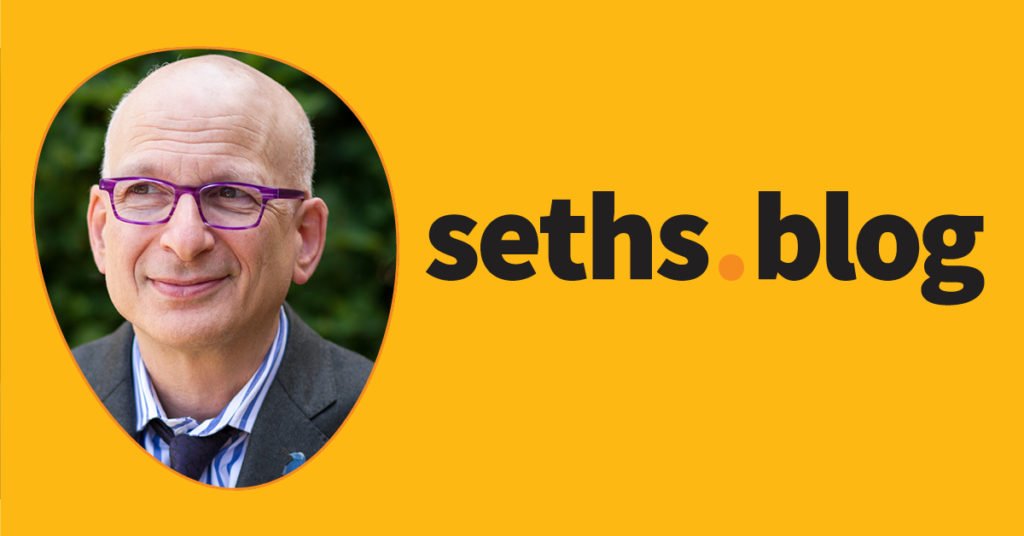The other day, I was talking to a friend in college. He was complaining about a lousy class he was taking, one that was now significantly worse because it was online. I asked why he was even taking it, and he looked at me like I was nuts.
He’s in it for the education, not the learning.
A colleague, recently graduated from a famous college, told me about the regime of clickers, used to make sure that students actually come to class and don’t fall asleep while they’re there.
The degree is what’s on offer, not fundamental change.
For a semester, I taught at the esteemed Stern business school at NYU, regularly ranked in the top twenty of all business schools. In every class, students angled for a way to do less work and have less engagement. One skill they had mastered was relentlessly narrowing the scope of their responsibility.
Compare this to the courses I taught at Mercy College, a local community college where most of the students had day jobs or small businesses. In every single session, they demanded more from me. More insight, more learning and yes, more homework. They made me stay late after every class. The difference was stunning—they were there to learn something.
None of this is surprising once you see how we got here.
Labor struggles with management. Management wants people to put in more effort, and never has enough to be satisfied—because productivity goes up if there’s more output for less money. In response, labor goes on defense and pushes to do less, because if they don’t, management will simply use them up and toss them out.
Organized education was built on this same model. There is a regular regime of measurement and testing. There are promotions, demotions and the risk of failing out. And at the end, the prize is a certificate that proves to management that you’re a suitable candidate for labor.
Contrast this with the joy of creativity. Of making something magical. Of art.
The artist rarely says, “I’d like to do less.” Instead, she wonders how to contribute more, because the very act of creativity is the point of the work.
You can learn just about anything now. Thirty years ago, that statement was ridiculous. In just one generation, we put everything you need to know about anything you want to know just a click away. The hard part isn’t access to it, the hard part is finding a cohort and a system that helps you do it. Because learning comes from doing.
We talk about ‘learning’ as though it’s as easy and natural as shopping or watching or doing errands. But it’s not. It’s a commitment, one that we regularly make up excuses to avoid. This simple idea from John Smith, for example. Easy to imagine, not that easy to do. Because you’ll have to get good at it as you go. Learning doesn’t have to be expensive to work.
Learning takes effort, and it’s hard to find the effort when the world is in flux, when we’re feeling uncertain and when we’re being inundated with bad news. But that’s the moment when learning is more important than ever.
[This week, we’re launching the 40th session of the altMBA. And for the people who signed up for it a few months ago, it will be a chance to actually learn something. Not to grind it out in search of a certificate, not to find a chance to do less, but to use the shift in our culture and the rhythm of our ideas to actually learn something.
Seeing the nearly 5,000 people around the world who have chosen to go on this journey together is thrilling. Year after year, we see the transformations, the shift in posture and possibility that happens after just a month. We’re looking for a few people to join us in July, I hope you’ll check it out.]
This shift is difficult to commit to, because unlike education, learning demands change. Learning makes us incompetent just before it enables us to grasp mastery. Learning opens our eyes and changes the way we see, communicate and act.
“What did you learn today,” is a fine question to ask. Particularly right this minute, when we have more time and less peace of mind than is usually the norm.
It’s way easier to get someone to watch–a YouTube comic, a Netflix show, a movie–than it is to encourage them to do something. But it’s the doing that allows us to become our best selves, and it’s the doing that creates our future.
It turns out that learning isn’t in nearly as much demand as it could be. Our culture and our systems don’t push us to learn. They push us to conform and to consume instead.
The good news is that each of us, without permission from anyone else, can change that.
